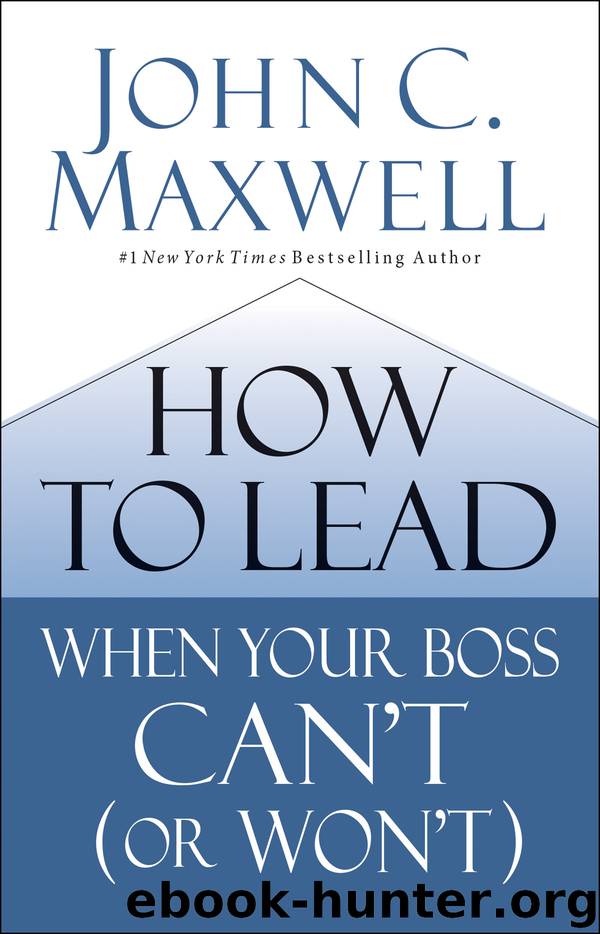How to Lead When Your Boss Can't (or Won't) by John C. Maxwell

Author:John C. Maxwell
Language: eng
Format: epub
Publisher: Harpercollins Leadership
Published: 2019-08-19T16:00:00+00:00
WHY PEOPLE OFTEN WAIT TO DEVELOP INFLUENCE
Sadly, too many people wait too long to start working to develop influence in their organizations. They often wait because they buy into myths that make them believe it’s too early to begin leading others. Often they’re waiting for a position to give them permission. I hope that’s not the case for you. Take a look at these reasons people wait.
1. THE DESTINATION MYTH:
“When I become the boss, I’ll start learning to lead.”
In 2003, Charlie Wetzel, my writer, decided he wanted to tackle a goal he had held for more than a decade: Run a marathon. Do you think Charlie just showed up at the starting line on race day and said, “Okay, I guess it’s time to figure out how to run a marathon”? Of course not. He started doing his homework a year in advance. He read reviews of marathons held around the United States and learned that the Chicago Marathon—held in October—enjoys great weather most years. It utilizes a fast, flat race course. It has a reputation for having the best fan support of any marathon in the nation. It was the perfect place for a first-time marathoner.
He also trained. He started the process in mid-April, increasing his mileage every week and eventually working his way up to two training runs of twenty miles each in addition to his other sessions. When race day came around in October, he was ready—and he completed the race.
Leadership is very similar. If you want to succeed, you need to learn as much as you can about leadership before you have a leadership position. You need to start developing your influence before you need it. Leading as well as you can wherever you are will prepare you for more and greater responsibility. Becoming a good leader is a lifelong learning process. If you don’t develop your influence, try out your leadership skills, and test your decision-making process when the stakes are small and the risks are low, you’re likely to get into trouble at higher levels when the cost of mistakes is high, the impact is far reaching, and the exposure is greater. Mistakes made on a small scale can be easily overcome. Mistakes made when you’re at the top cost the organization greatly, and they damage a leader’s credibility. As UCLA basketball coach John Wooden said, “When opportunity comes, it’s too late to prepare.”
Download
This site does not store any files on its server. We only index and link to content provided by other sites. Please contact the content providers to delete copyright contents if any and email us, we'll remove relevant links or contents immediately.
Hit Refresh by Satya Nadella(8338)
The Compound Effect by Darren Hardy(7561)
Change Your Questions, Change Your Life by Marilee Adams(6641)
Nudge - Improving Decisions about Health, Wealth, and Happiness by Thaler Sunstein(6633)
The Black Swan by Nassim Nicholas Taleb(6192)
Daring Greatly by Brene Brown(5643)
Deep Work by Cal Newport(5468)
Principles: Life and Work by Ray Dalio(5322)
Rich Dad Poor Dad by Robert T. Kiyosaki(5150)
The Myth of the Strong Leader by Archie Brown(4789)
Man-made Catastrophes and Risk Information Concealment by Dmitry Chernov & Didier Sornette(4738)
Big Magic: Creative Living Beyond Fear by Elizabeth Gilbert(4723)
The Slight Edge by Jeff Olson(4722)
Discipline Equals Freedom by Jocko Willink(4638)
Digital Minimalism by Cal Newport;(4545)
The Motivation Myth by Jeff Haden(4528)
Stone's Rules by Roger Stone(4416)
Management Strategies for the Cloud Revolution: How Cloud Computing Is Transforming Business and Why You Can't Afford to Be Left Behind by Charles Babcock(4131)
The Doodle Revolution by Sunni Brown(4043)
